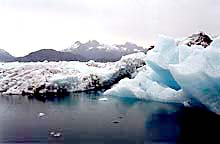
While exploring Alaska's seamounts, the ocean explorers will try to answer your questions. Click image for larger view.
Ask an Explorer
Questions were sent to the Alaska Seamount team throughout this mission. Selected questions and answers are offered below.
Question from Biology Teacher, McAlester, OK: I am curious about the daily routines of the ship's crew and the researchers on board the R/V Atlantis, such as eating/sleeping schedules, duty schedules, etc. Do the researchers spend most of their time working while on board or do they find considerable time on their hands during the expedition?
Response from Catalina Martinez, NOAA Office of Ocean Exploration: Time on any research expedition is typically used to the fullest extent because this very special time is limited and extremely expensive. Some scientists work around the clock, and the ship's crew works on rotating shifts so that work is always getting done, regardless of the time of day or night.
The crew of the Atlantis all have specific positions and duties. Some work on a rotating schedule, while others work a regular day shift. The officers and Able Bodied Seamen (ABs) are on a seawatch of four hours on and eight hours off, so there is an officer and an AB on the Bridge at all times. The Ordinary Seamen (OSs) work a day shift on this cruise, since most of them are needed during the day when they launch and recover the Alvin submersible. This crew also rotates through evening positions to accomplish the scientific work that is often scheduled. The Alvin pilots and technicians work during the day to operate and maintain the sub, and their day ends when their work is complete. This is often a very long day.
There are one or two Woods Hole Oceanographic Institution computer technicians on board who work a day shift, but are also needed at night for various evening tasks such as seabeam mapping. The crew of the engine room also work a dayshift, but one of them is always available via a 24-hour rotating beeper system.
The science crew members spend their time in various ways, depending on the type of work they are doing, whether or not they have to prepare for a dive, and whether or not they have samples/data to work up from a previous dive. Some of the work must be done during the day and some must be done at night. So they typically split shifts and work pretty much around the clock. Alvin dives are conducted during the day only, and biological and geological samples, as well as videographic images, are collected that must be analyzed by the scientists after each dive. Specific to this cruise, seabeam mapping, gravity cores, CTD casts, and CHIRP subbottom profiles are done at night. So a science crew, as well as part of the ship's crew, must be available at night for this work. None of the evening tasks can be accomplished during the day while the Alvin is on a dive because the Atlantis must be committed solely to the Alvin the entire time it is diving.
When the Atlantis or science crew is off-duty, they might watch a movie or do their laundry, or exercise in the small gym they have on board. Some of the ship's crew may also spend time in the science labs watching the Alvin videos with the science crew or observing other forms of science that might be going on. There is also a ping-pong table on board that is very well used, and a small library full of interesting and well-loved books. Some crew like to write or play instruments, and some have video games and board games, among other things, to occupy their free time. Decorating Styrofoam cups and other Styrofoam items is a major activity on a research vessel that does deep-sea work because these items often are sent down on the sub to be compressed at depth. If the weather permits, many off-duty crew members can be seen on deck looking for birds, whales, and other marine life, fishing, or just enjoying their free time at sea.
What medication, generally, is effective in combating what surely must be the epitome of upset stomach?
Response from Paula Keener-Chavis, NOAA Office of Ocean Exploration: People who have trouble with seasickness while on a research vessel use a variety of remedies for this most uncomfortable feeling. Some use transderm patches behind their ears that deliver a medication across the skin for a period of several days. Others use medications like Dramamine, Bonine, or Merezine, and others use medications that are prescribed by a doctor. Other people find that wrist bands with pressure beads or other devices that deliver small electrical shocks to certain nerves on the arm effective. Others sleep it off for the first day or two.
Some scientists and vessel crew never get over feeling seasick and just learn to accomplish their work in spite of it. Sometimes even computer work and recording data on data forms can trigger seasickness. Whatever the individual choice of remedy, most people do not deviate from it once they find something that consistently works. Eating healthy foods and getting as much rest as you can, which can be difficult on a research vessel in high seas, is also extremely important.
Ginger is a remedy used by many for nausea. Most of the small-boat fishermen in Puerto Rico chewed ginger root exclusively for seasickness when I was there in the mid nineties. Scientists on research ships will often bring ginger snap cookies with them as well as candied or dried ginger.
Being on deck and watching the horizon works for some, and watching the waves works for others. Staying well hydrated is very important, as dehydration will only exacerbate symptoms.
Sign up for the Ocean Explorer E-mail Update List.


























